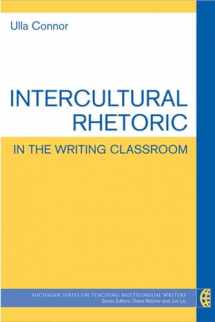
Intercultural Rhetoric in the Writing Classroom (The Michigan Series on Teaching Multilingual Writers)
Book details
Summary
Description
It is easy to argue that the need for attention to how we navigate rhetorically within and across cultures has never been greater, given ever-increasing global migrations and seemingly instantaneous global communication. Yet, the conceptual basis of intercultural rhetoric (also known in the past as contrastive rhetoric) has been under fire ever since it first emerged as an area of research and pedagogical interest.
In recent years, Ulla Connor has built a steadily more extensive and sophisticated case for how a culturally contextualized study of rhetoric in any media can be carried out without static and reductive over-generalizations about culture/s or rhetoric. This volume provides both an eloquent summation and further theoretical expansion of Connor’s arguments.
Readers who have wondered about the possibility of exploring connections between their students’ (or anyone’s) culture and discourse style will find many of their questions addressed in this volume; other readers who have not previously raised such questions will very likely begin to see the value of doing so.


We would LOVE it if you could help us and other readers by reviewing the book
Book review



